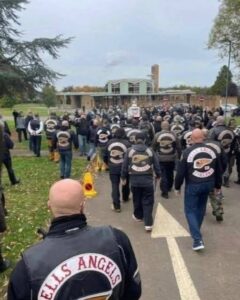Nobody expected fifty bikers at my son’s funeral—least of all the four boys who bullied him into it. My fourteen-year-old, Mikey, hanged himself in our garage. His note named classmates who told him daily to kill himself. The police said it was “unfortunate but not criminal.” The school offered only “thoughts and prayers.” I’d never felt so powerless.

Then Sam showed up. A gray-bearded biker I knew from the gas station, he told me his nephew had also died from bullying. He handed me a number: “Call if you want us there. No trouble—just presence.” The night before the funeral, I found Mikey’s journal and cruel messages telling him to end his life. My hands shook as I dialed.
The next morning, the roar of Harleys filled the cemetery. Dozens of bikers lined up in solemn silence, forming a corridor of protection. When the bullies and their parents arrived, their smirks vanished. Sam spoke: “We’re here to make sure today is about Mikey—a boy who deserved better.”
The service became more than grief—it was accountability. The bikers later visited the school, spoke about bullying, and forced silence to break. Other districts invited them. Policies changed. I still carry Sam’s number. Sometimes I ride with them. We can’t bring Mikey back, but maybe our thunder saves the next child.